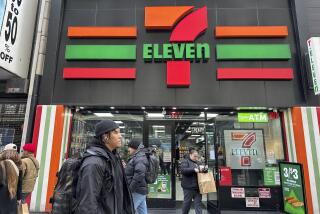Carter Hawley Studies Suit Over Reorganization : Retailing: The question is whether the 1987 revamping left the company with so much debt that it couldnât operate profitably.
A special committee of Carter Hawley Hale Stores directors is investigating whether the company should seek possible damages stemming from its costly anti-takeover reorganization in 1987, according to court papers and sources close to the companyâs bankruptcy case.
The investigation came at the prodding of Carter Hawleyâs creditors, who have questioned whether the 1987 restructuring doomed the company by loading it with more debt than it could bear. In theory, damages could be sought from anyone who benefited from the deal, including corporate officers, directors, lawyers, bankers and other advisers.
Four years ago, Carter Hawleyâs board approved a $1.1-billion corporate overhaul that spun off the companyâs Neiman Marcus group to General Cinema, then Carter Hawleyâs largest shareholder.
The special committee of outside board members was formed in June âto investigate certain potential causes of action,â according to papers filed by Carter Hawley in U.S. Bankruptcy Court last week. The filings said the panel hired the Los Angeles law firm of Hufstedler, Kaus & Ettinger to aid in its investigation âand, if appropriate, to serve as counsel to litigate the issues.â
Serving on the special committee are four outside directors who joined Carter Hawleyâs board following the 1987 restructuring: Sidney R. Petersen, Caroline Leonetti Ahmanson, Leland C. McGraw and Dennis C. Stanfill.
The investigation was the subject of a closed-door hearing on Friday before U.S. Bankruptcy Judge James Dooley. The pleadings from the hearing were ordered sealed.
Spokesmen for Carter Hawley, the special board panel and the creditors committee declined to comment.
Sources said the special committee was investigating whether damages are warranted under a complex and murky legal concept called fraudulent conveyance.
The concept applies to transactions in which companies allegedly fail to receive a fair price for their assets and are left too crippled financially to continue operating successfully. In these circumstances, it does not address whether fraud or negligence contributed to a companyâs downfall.
Los Angeles-based Carter Hawley, the biggest department store company in the West and the parent of Southern Californiaâs Broadway chain, sought Chapter 11 bankruptcy court protection from creditors on Feb. 11.
The company continues to operate its 89 stores.
More to Read
Inside the business of entertainment
The Wide Shot brings you news, analysis and insights on everything from streaming wars to production â and what it all means for the future.
You may occasionally receive promotional content from the Los Angeles Times.










